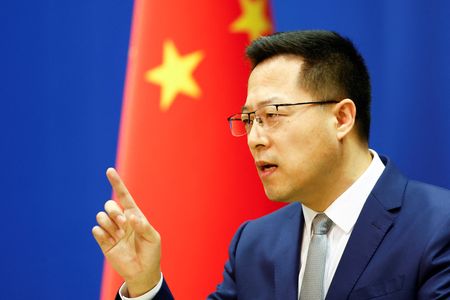
Beijing says ‘smear campaign’ as US terms China ‘most serious challenge to international order’

Beijing/Washington, May 27 (PTI) China on Friday dismissed US’ description of Beijing being the “most serious long-term challenge to the international order”, terming it as a “classic piece of disinformation and a smear campaign”.
Addressing an audience at US-based George Washington University on Thursday, Secretary of State Antony Blinken said China is the only country with both the intent to reshape the international order and, increasingly, the economic, diplomatic, military, and technological power to do it.
He called China “the most serious long-term challenge to the international order”, and the US, while stepping up competition with “invest, align, compete” strategy, will, however, avoid conflict or new Cold War with the Communist country.
China sharply hit back at Blinken, terming his observations as a “classic piece of disinformation and a smear campaign”.
“This speech of Secretary Blinken is a voluminous one. He went to great lengths to spread disinformation, play up the so-called ‘China threat’, interfere in China’s internal affairs and smear China’s domestic and foreign policy,” Chinese Foreign Ministry spokesman Wang Wenbin said.
“The sole purpose is to contain and suppress China’s development and maintain the US hegemony. China deplores and rejects this,” he said.
Wang said international rules and order have been clearly defined and China has always maintained that all countries should firmly uphold the international system with the UN at its core.
In his speech spanning over 40 minutes, Blinken outlined his administration’s strategy towards China which included building up a “network of allies and partners, acting with a common purpose and in common cause” and referred to Washington’s efforts to build close ties with India as well as the recent Quad meeting in Tokyo.
“And we’re standing up new coalitions to deliver for our people and meet the tests of the century ahead. Nowhere is this more true than in the Indo-Pacific region, where our relationships, including our treaty alliances, are among our strongest in the world,” he said.
Wang also hit out at Quad — comprising India, Japan, the US and Australia; and AUKUS — a trilateral security pact between Australia, the UK and the US.
Creating “small cliques” is reversing the course of history. Forging “small blocs” is against the trend of history. The US created the so-called “Indo-Pacific strategy” to rope in regional countries to contain China, and claims to “shape the strategic environment around Beijing”, he said.
“This move to gang up on China will get no support and is doomed to fail,” Wang warned.
Blinken has also repeatedly stressed that the US does not seek to stymie China as a world power or change its political system, nor does it seek a clash with it.
“We are not looking for conflict or a new Cold War. To the contrary, we’re determined to avoid both,” Blinken said.
He said the US is ready to strengthen diplomacy and increase communication with China “across a full range of issues” and is prepared to work together on matters of mutual interest like climate change and Covid-19, noting that “even as we invest, align and compete, or together with Beijing, where our interests come together”.
“We can’t let the disagreements that divide us stop us from moving forward on the priorities that demand that we work together for the good of our people and for the good of the world,” Blinken said.
In his response, Wang said China has noted Blinken’s statement that the US is not looking for conflict or a new Cold War with China; it doesn’t seek to block China from its role as a major power, nor to stop China from growing its economy; and it wants to coexist peacefully with China.
“We are watching what the US will do,” he said.
In his speech, Blinken said President Joe Biden during his trip to the region, reaffirmed US’ vital security alliances with South Korea and Japan, and deepened its economic and technology cooperation with both the countries.
Biden launched the Indo-Pacific Economic Framework (IPEF) for prosperity, a first-of-its-kind initiative for the region. “It will, in the President’s words, ‘help all our countries’ economies grow faster and fairer,” Blinken said.
“IPEF, as we call it, renews American economic leadership but adapts it for the 21st century by addressing cutting-edge issues like the digital economy, supply chains, clean energy, infrastructure, and corruption,” he said.
A dozen countries, including India, have already joined. Together, IPEF members make up more than a third of the global economy, Blinken said.
“The president also took part in the leaders’ summit of the Quad countries…It is becoming a leading regional team. This week, it launched a new Indo-Pacific Partnership for Maritime Domain Awareness, so our partners across the region can better monitor the waters near their shores to address illegal fishing and protect their maritime rights and their sovereignty,” he said.
“We’re enhancing peace and stability in the Indo-Pacific; for example, with the new security partnership between Australia, the UK and the US, known as AUKUS,” Blinken said.
The Biden administration’s approach will be “invest, align, compete”, he said, adding that although the US does not seek conflict with China, it is prepared to defend its interests.
Blinken sought to underscore the degree to which the Washington-Beijing relationship is “one of the most complex and consequential relationships of any that we have in the world today”.
As he broadly described how the US intends to approach that relationship, Blinken drew sharp distinctions between the two nations, describing things like China’s “repressive” government, unfair trade practices and human rights abuses.

















POST COMMENTS (0)